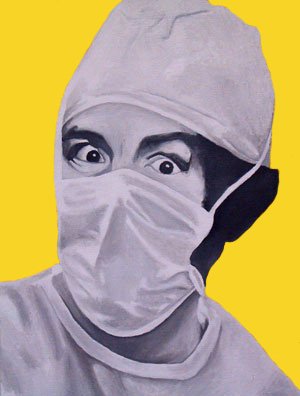| Greedy Obsolete Doctors
The Health eZine - Healthcare
Greedy doctors is the problem, and a lax government that doesn't care about the health of its citizens. Nevermind that healthy citizens make better workers and boost the economy. Nevermind that healthy soldiers make better soldiers and boost the well-being of our armed forces. Nevermind that obesity rates are skyrocketing and we don't even teach physical education in schools anymore. Nevermind that college and university drop-out rates are 40% higher amongst students with health problems. Do you know anyone who couldn't work because they couldn't afford the proper healthcare treatment? Do you know anyone who tried out for the army but couldn't pass the physical (they recently lowered their standards again)? Do you know anyone who is obese and lacks the willpower to go exercise?
Meanwhile in Canada healthcare is free. Got an injury or ailment? Walk into your local hospital and get all the treatment you need... provided you are Canadian and have hospital card to prove it. Why can't we create a Canadian-style healthcare system in America? Canada's economic GDP was only $1.165 trillion USD in 2006. The GDP for the United States in 2006 was $12.98 trillion USD. We are over ten times more wealthy than Canadians. Canada's population is 34 million. Ours is 298 million. We could easily create a free healthcare system in the United States that is even better than that in Canada. But with one problem. Canada's healthcare system is regulated by the government. Doctors have fixed wages and can only earn so much. In America our doctors are greedy and they can charge whatever they want. In other words, our doctors have a GOD complex. They have the power to save people, but can choose not to do it simply for the sake of money. And thats what is wrong with America today. Our consumption of money has made us forget the simple things like the Hippocratic Oath: Hippocratic Oath — Modern Version
The Hippocratic Oath Today:
Yet paradoxically, even as the modern oath's use has burgeoned, its content has tacked away from the classical oath's basic tenets. According to a 1993* survey of 150 U.S. and Canadian medical schools, for example, only 14 percent of modern oaths prohibit euthanasia, 11 percent hold convenant with a deity, 8 percent foreswear abortion, and a mere 3 percent forbid sexual contact with patients—all maxims held sacred in the classical version. The original calls for free tuition for medical students and for doctors never to "use the knife" (that is, conduct surgical procedures)—both obviously out of step with modern-day practice. Perhaps most telling, while the classical oath calls for "the opposite" of pleasure and fame for those who transgress the oath, fewer than half of oaths taken today insist the taker be held accountable for keeping the pledge. Indeed, a growing number of physicians have come to feel that the Hippocratic Oath is inadequate to address the realities of a medical world that has witnessed huge scientific, economic, political, and social changes, a world of legalized abortion, physician-assisted suicide, and pestilences unheard of in Hippocrates' time. Some doctors have begun asking pointed questions regarding the oath's relevance: In an environment of increasing medical specialization, should physicians of such different stripes swear to a single oath? With governments and health-care organizations demanding patient information as never before, how can a doctor maintain a patient's privacy? Are physicians morally obligated to treat patients with such lethal new diseases as AIDS or the Ebola virus? Other physicians are taking broader aim. Some claim that the principles enshrined in the oath never constituted a shared core of moral values, that the oath's pagan origins and moral cast make it antithetical to beliefs held by Christians, Jews, and Muslims. Others note that the classical Oath makes no mention of such contemporary issues as the ethics of experimentation, team care, or a doctor's societal or legal responsibilities. (Most modern oaths, in fact, are penalty-free, with no threat to potential transgressors of loss of practice or even of face.) With all this in mind, some doctors see oath-taking as little more than a pro-forma ritual with little value beyond that of upholding tradition. "The original oath is redolent of a convenant, a solemn and binding treaty," writes Dr. David Graham in JAMA, the Journal of the American Medical Association (12/13/00). "By contrast, many modern oaths have a bland, generalized air of 'best wishes' about them, being near-meaningless formalities devoid of any influence on how medicine is truly practiced." Some physicians claim what they call the "Hypocritic Oath" should be radically modified or abandoned altogether. What is your opinion? What do you feel is the Hippocratic Oath's relevance in today's America? Is it a pointless anachronism or an invaluable moral guide? Should aspiring doctors still be made to take some version of the oath? If you're a doctor, would you take the oath again? Why?
|




|
 G.O.D. - Whats Wrong with America's Healthcare System?
G.O.D. - Whats Wrong with America's Healthcare System?
 Do you know anyone who dropped out of college or university because of a health problem?
Do you know anyone who dropped out of college or university because of a health problem?
 The Hippocratic Oath (see ancient and modern versions) is one of the oldest binding documents in history. Written in antiquity, its principles are held sacred by doctors to this day: treat the sick to the best of one's ability, preserve patient privacy, teach the secrets of medicine to the next generation, and so on. "The Oath of Hippocrates," holds the American Medical Association's Code of Medical Ethics (1996 edition), "has remained in Western civilization as an expression of ideal conduct for the physician." Today, most graduating medical-school students swear to some form of the oath, usually a modernized version. Indeed, oath-taking in recent decades has risen to near uniformity, with just 24 percent of U.S. medical schools administering the oath in 1928 to nearly 100 percent today.
The Hippocratic Oath (see ancient and modern versions) is one of the oldest binding documents in history. Written in antiquity, its principles are held sacred by doctors to this day: treat the sick to the best of one's ability, preserve patient privacy, teach the secrets of medicine to the next generation, and so on. "The Oath of Hippocrates," holds the American Medical Association's Code of Medical Ethics (1996 edition), "has remained in Western civilization as an expression of ideal conduct for the physician." Today, most graduating medical-school students swear to some form of the oath, usually a modernized version. Indeed, oath-taking in recent decades has risen to near uniformity, with just 24 percent of U.S. medical schools administering the oath in 1928 to nearly 100 percent today.